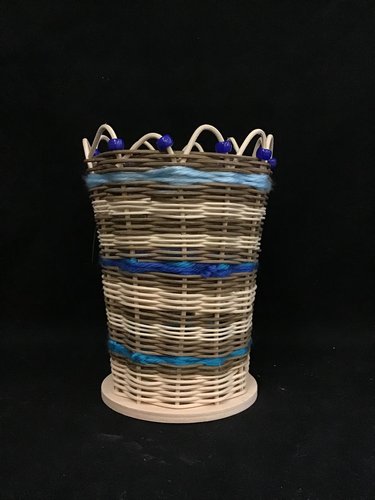GCSD school board: ‘Students do want to be heard’
An Iroquois-inspired basket, woven by Iris Regan, a fourth-grader at Lynnwood Elementary School, was selected for the Legislative Student Art Exhibit.
GUILDERLAND — Listening to students was a recurring theme for the Guilderland School Board at its March 29 meeting.
Board member Nathan Sabourin referenced the three students who had spoken to the board in February about education on safe gun storage, and said he’d like to get more civic involvement from students on the board level.
He suggested having students make recommendations for policy changes.
Sabourin said a lot of students watch board meetings and quipped that he’s expecting “millions of emails” in response to his suggestion.
Vice President Gloria Towle-Hilt reported that the board’s communication committee had reflected on the recent ThoughtExchange — in which students, staff, and community members could give their budget priorities online — and focused on how to engage students.
Although many of the students’ comments were not related to the budget, the feedback was important, she said.
“Students do want to be heard,” Towle-Hilt said, urging that the board find ways to listen.
Board member Kim Blasiak reported that the committee on diversity, equity, and inclusion, sparked by Islamic students’ requests to have Eid be a school holiday, continued to discuss multi-cultural observances, “something we all want to do.”
The committee members decided “adding all the dates to the calendar would be difficult,” Blasiak said. “We talked about having students do read-alongs for their cultures, maybe highlighting certain multi-cultural areas.”
She also said the committee voted to move forward a resolution to the board to change Columbus Day to Indigenous Peoples’ Day, which will be discussed with public comment at a later date.
In the first week of his presidency, Joe Biden declared October 11, 2021, as Indigenous Peoples’ Day — the first president to do so — calling “upon the people of the United States to observe this day with appropriate ceremonies and activities.”
The Guilderland committee is also working on a land-acknowledgement declaration, which is taking time to research. “They want it to be authentic, to see whose land we’re on,” said Blasiak.
Budget
Superintendent Marie Wiles has proposed a $110 million budget for next year, an increase of nearly 5 percent over this year, which would increase the tax levy by nearly 3 percent — still under the state-set cap of 3.20 percent.
The March 29 meeting began with a request from Kerry Dineen, a music teacher at Pine Bush Elementary School who is also Altamont’s mayor, to spend federal funds to reduce class size.
She called first through third grade “pivotal” where children are feeling the effects of COVID. Dineen noted that, in the ThoughtExchange, parents had lower class sizes as a priority.
“Management right now is a daily struggle,” said Dineen, who, as a music teacher, visits all the classrooms. “Help these kids get through the impact of the last two years,” Dineen implored the board.
Towle-Hilt said at the end of the meeting that the communications committee had discussed how hard it is to explain to the public why, with the large increase in aid, more needs aren’t being met. She noted the unexpected, significant cost of new special-needs students in the district having out-of-district placements.
Private special-education costs are expected to go up $1,129,440,” Wiles had said in her March 8 budget presentation. “We have no choice but to serve our students,” she said.
Towle-Hilt also said it is hard to explain why federal funds can’t be used to reduce class sizes. Wiles has said repeatedly that the federal aid for pandemic relief is not part of the district’s operating budget and is to be spent on one-time uses.
At the board’s March 15 meeting, responding to a request to use the federal funds to pay for more hours for an Altamont Elementary librarian, bringing that post in line with the other district elementary schools, Wiles said that the federal funds would be “going away” so shouldn’t be used for permanent posts.
In informing the public about the budget, which goes to vote on May 17, Towle-Hilt said the committee believes it’s important to point out the budget focuses on the whole child, it supports co-teaching and a commitment to a healthy and safe environment, and it phases in class-size reduction at the middle school.
The district had wanted to reduce class size in all three grades at Farnsworth Middle School, Wiles has said earlier, but could only afford to do so for the eighth grade next year, at a cost of $220,400.
Towle-Hilt said the district’s April newsletter will serve as a prelude to the budget information that goes out in May.
Elections
In addition to voting on the budget and a school-bus proposition, voters on May 17 will also elect school board candidates.
The nine-member board typically has three three-year posts up for election each year. This year, those three seats are held by Barbara Fraterrigo, Kelly Person, and Towle-Hilt.
Additionally, the seat to which Blasiak was appointed in October will be up for election.
The top three vote-getters will serve three-year terms, and the candidate who comes in fourth will serve a one-year term.
Petitions, available through the district clerk, must have at least 52 signatures of eligible district voters — 2 percent of the number who voted last May — and must be returned to the clerk by on or before Monday, April 18, by 5 p.m.
A candidate must be able to read and write, be at least 18 years old, a qualified voter, and a district resident for at least one year prior to the date of the vote on Tuesday, May 17.
Start time
This school year, after a quarter-century of discussion, the district began a later start time for high school students. The move was made because science has shown that adolescents need more sleep.
In the midst of a bus-driver shortage, Wiles said it was a struggle to get buses to the high school and middle school at the start and end of every day.
She has reconvened the task force that originally met on the issue to “review the challenges” of the 2021-22 school year. In addition to the driver shortage, she said, there are also problems caused by heavy traffic, particularly routes 20 and 146, and by the spread-out locations of the district’s seven schools.
Parents have been surveyed on the topic as well as students at the middle school and high school, Wiles said.
“One of the things we discovered was that our response rate for students was not as robust as when we first did this survey back in 2018,” Wile said. So the students will be surveyed again, during their homeroom period.
Faculty will also be surveyed on how students are responding in their classes with the added sleep.
“The bottom line is, it’s a really challenging conundrum,” said Wiles. A decision needs to be reached by early May, she said, adding “Stay tuned.”
Board member Rebecca Butterfield, a pediatrician, said she was a proponent of the later start time but also said she was a pragmatist. If half of the high school students are arriving late on a regular basis, “That’s not sustainable either,” Butterfield said.
While a consensus is needed, she concluded, “I don’t think there’s a perfect answer.”
Other business
In other business at the March 29 meeting, the board:
— Elected Person to serve as president pro tem to run the meeting since the president, Seema Rivera, was absent and the vice president, Gloria Towle-Hilt, participated remotely. In addition to Kelly, Judy Slack, Butterfield, Sabourin, and Blasiak attended in person while Fraterrigo and Blanca Gonzalez-Parker as well as Towle-Hilt participated virtually;
— Heard a request from Gonzalez-Parker, asking, “Are we allowed to have an eighth-grade dance?” Wiles said she would bring it to the committee that is helping the district to navigate the pandemic.
“We have a lot of cases at the middle school,” Wiles said, “so we need to balance the need to give students the opportunity to have these important experiences but also to keep our eye on the health and safety needs as well”;
— Heard congratulations for art teacher Krista Gillis, and her Lynnwood Elementary students, Iris Regan and Michelle Williams, because their artwork is being showcased in this year’s Legislative Student Art Exhibit. The virtual event, which runs through December, features artwork from students in kindergarten through 12th grade across the state.
Fourth-grader Iris wove an Iroquois-inspired basket and fifth-grader Michelle sculpted a portrait titled “Grandpa”; and
— Adopted policies on preventing cyberbullying and cyber threats.
Any parent who believes a student has been subjected to either is to “report the bullying or threats to a teacher or an administrator immediately so that assistance and support can be provided.” Any faculty or staff member is to report it to a supervisor or principal.
“The building principal will investigate the incident and take the appropriate disciplinary actions,” the policy says.



